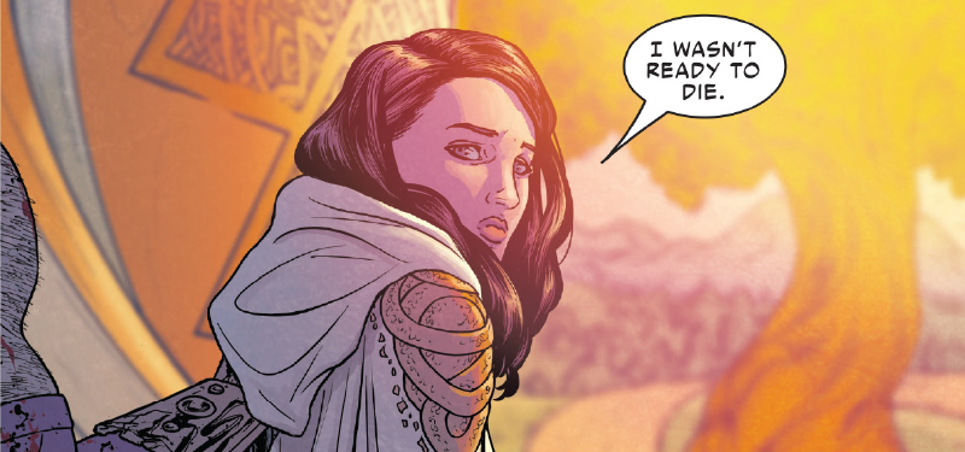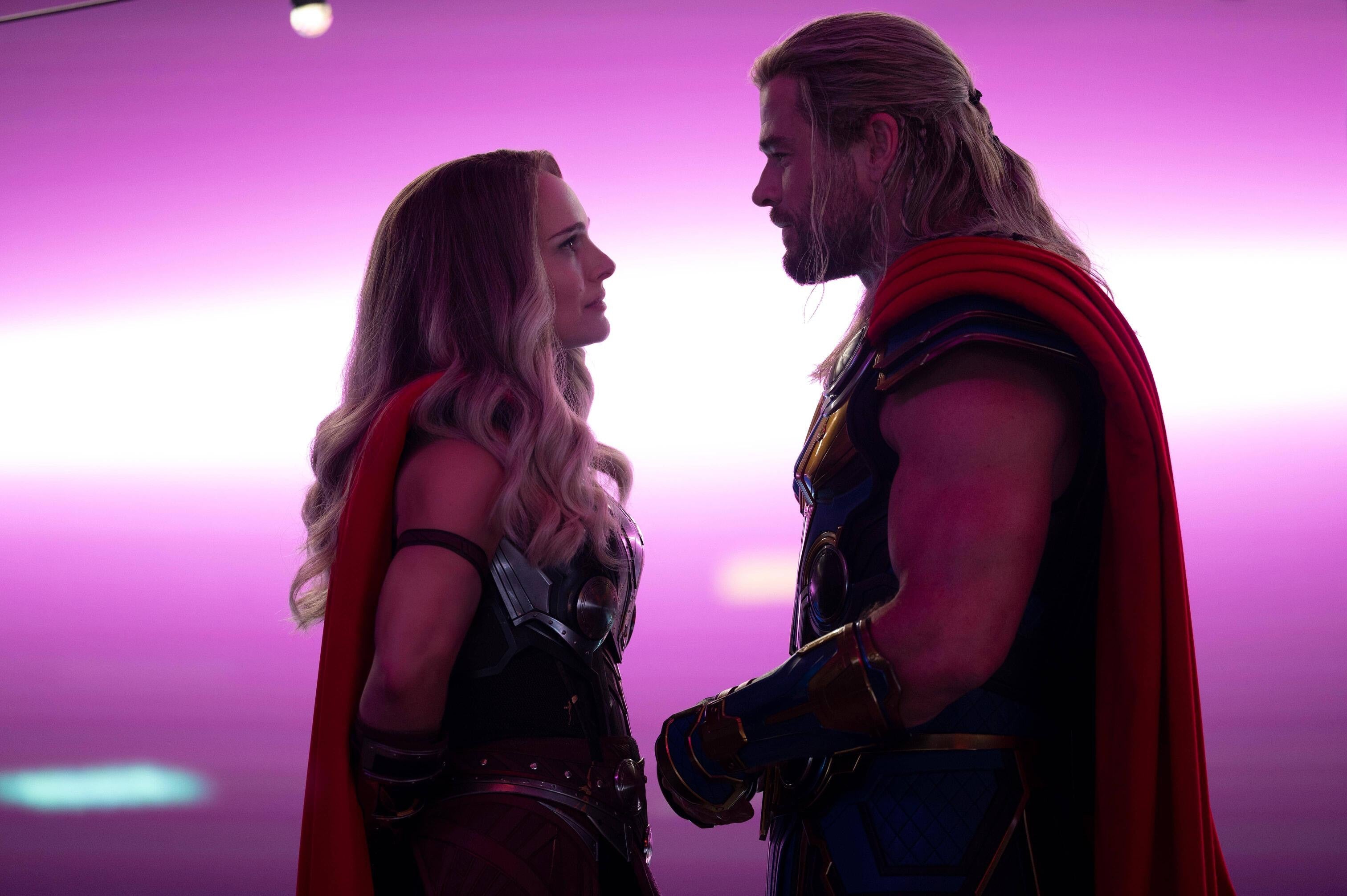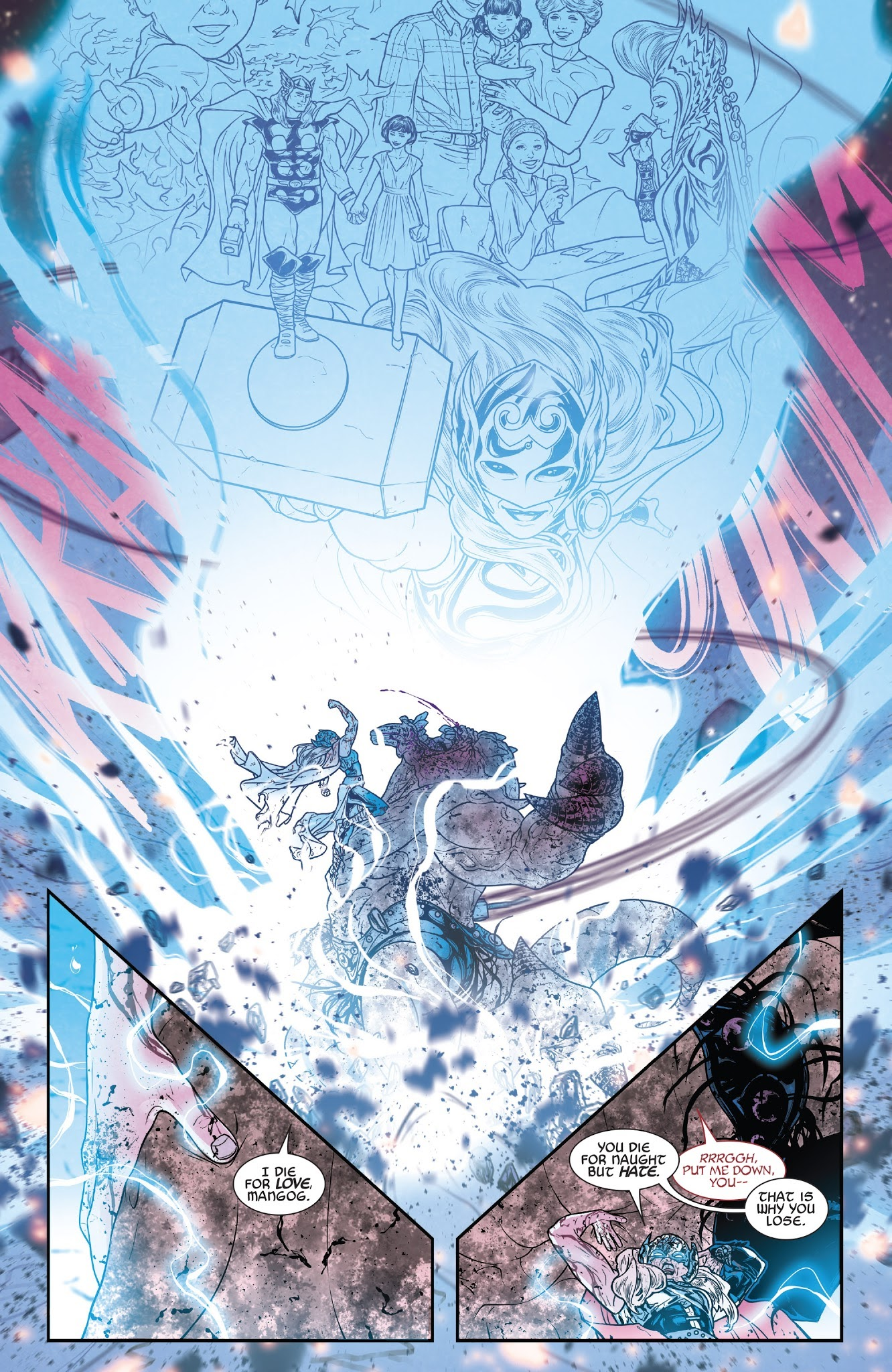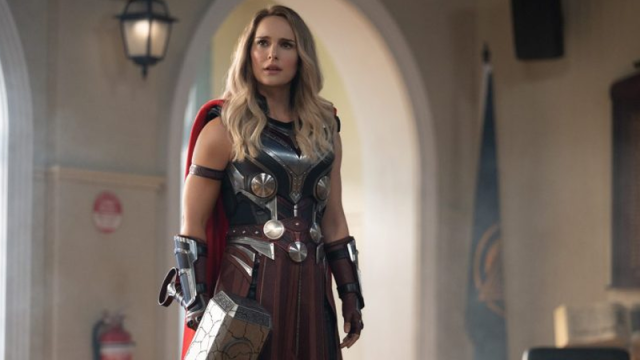Jane Foster stands at the gates of Valhalla, having earned a warrior’s rest after making a sacrifice so worthy that even she, a mortal, had gained the respect of Asgard’s fallen heroes. But she waits a moment, turning from the gates of eternal paradise. All she can say is “I wasn’t ready to die.”

This is the moment that climaxes The Mighty Thor #706, the last regular issue with Jane Foster as the titular hero. Having defeated the vengeful beast Mangog before it could lay waste to all of Asgard, Jane, sacrificing Mjolnir and finally succumbing to the cancer whose treatment was being purged from her body every time she transformed into Thor, still clung to life to the very end. In the comic, she is rewarded with this faith and love, and her selfless sacrifice in spite of that love, by having touched the heart of even Odin himself — a man who had despised her for assuming his son’s role, even at the Odinson’s lowest. Working together with his son and the god-tempest once held in Mjolnir itself, the two Asgardians give Jane a reward even greater than eternal rest: a chance at life, a chance to face her illness and overcome it as Jane Foster, rather than the Mighty Thor.

This is not the Jane Foster, nor the Mighty Thor, that we find in Marvel’s latest movie, Thor: Love and Thunder. There are similarities, to be sure — both Janes have cancer, although the movie never dives deep into just what cancer Jane has in its surface-level depiction of her treatment, both Janes become the Mighty Thor, and of course there’s a level of aesthetic similarity in their hero costumes. Both make the final sacrifice, and both go to Valhalla — it’s just that in Love and Thunder, that’s where Jane stays, and the reason she makes the decision to die and go out with one last turn as Thor is not for the love of the life that she lived so vigorously in defiance of her illness, but… well, the other love of her life, Thor Odinson.
It’s not even really a problem that Jane’s arc in Love and Thunder is inextricably tied to her romantic relationship with Thor, to the point that even her cancer plot feels swept aside between all the jokes and mood swings of the movie — that instead of dying for all the things she loves, she largely dies specifically for him. OK, maybe it kind of is, but it’s not the problem that I’ve been thinking about so much ever since I saw the movie during its opening weekend. It’s that Valhalla post-credits scene, Jane shocked, but happy, that she has found this place in paradise with Heimdall and all the other fallen Asgardians. That’s… that’s just not The Mighty Thor.

Jason Aaron, Russel Dauterman, Matthew Wilson, and Joe Sabino’s three-year journey with Jane in the pages of her two Thor tiles are too vast to condense into a singular movie, but the Mighty Thor of Love and Thunder and the Mighty Thor of those comics might as well pale in comparison. As part of the movie’s general tonal disparity between wanting to be a Ragnarok-esque comedy romp while also engaging with plotlines dealing with things like cancer, or grief and loss, Jane’s persona when she becomes Thor in Love and Thunder avoids much of the latter to focus on the former, for all the talk ahead of release of her major storyline. She’s awkward and clumsy as an inexperienced superhero, she has an ongoing gag about trying to figure out a suitable catchphrase having tried many, many terrible ones. She gets to fight and be strong and kick arse, but she’s more of a vehicle for comic relief, and as a vessel for Thor himself to pine after, until it comes time for her to make her sacrifice for his sake and die in his arms, then she is on her own arc as a character. We never even learn what cancer she has (it’s breast cancer in the comics), it’s just “cancer,” touched on and left until it’s time for her to be sick and dead at the end of the film, never explored or interrogated — save for one moment where a furious Jane-Thor smashes a bathroom sink after being momentarily woozy — because the film’s understanding of her is built around jokes and action rather than an attempt to explore how her character feels bout any of this. She’s there to crack jokes, kick arse, and die.
The Jane of The Mighty Thor, in contrast, is bursting with a depth of life that Love and Thunder’s superficiality could never match. It’s there in her defiance of Asgardian royalty and supervillains alike to claim the name of Thor for herself, and her insistence to face her breast cancer head on as a human, not as an ally of literal gods — a stark contrast to Love and Thunder’s Jane, who is presented as practically leaping at the chance at using Mjolnir to help stall her illness. It’s there in all her brash decisions, from charging hammer-first into fights with everyone from Odin to the Phoenix Force, to even the simple act of kissing Sam Wilson’s Captain America while on a mission with the Avengers, just because she can. Every moment Jane is Thor, she is doing the most, for the most people she can, and loving every second of it because it makes her feel alive in a way her illness is slowly denying her. In her final battle with the Mangog she smashes the creature in the face with a powerful right hook, and bellows after it asks why she would die for these gods that despise her: “I die for love, Mangog. You die for naught but hate — that is why you lose.”

That love is indeed for Thor Odinson, in part, as it ultimately is in Love and Thunder. But it’s not just for him. The splash page this line is presented on in The Mighty Thor #705 stretches up and up from Jane’s punch, a massive krakoom rising above it as we see glimpses of her life: as a child with her parents, holding hands with the Odinson as a young woman, as a cancer patient drinking with Freyja, as Thor herself. Jane’s love encompasses more than just romantic love, but a love for life itself, a live she truly loved living as a Thor or otherwise, and that is the sacrifice she is willing to make it for, not just a single man.
I wish Love and Thunder could’ve understood that. I wish Natalie Portman’s Jane was given the time to have even an ounce of the vigour her comic book counterpart had — to say no, she didn’t want to go yet, when she stood at the gates of eternal rest. Instead, she’s left to simply die, unexplored, unwanted beyond her necessity to push Thor into his new status quo as a clumsy adoptive father. The Mighty Thor comics were always going to be about Jane facing death, from the very first moment she picked up Mjolnir. But every step of the way, she defied that conclusion with an overwhelming love for life. Love and Thunder’s Jane is asked to simply accept it, if not for herself, but at least for the Thor it cares much, much more about.
Want more Gizmodo news? Check out when to expect the latest Marvel and Star Wars releases, what’s next for the DC Universe on film and TV, and everything you need to know about House of the Dragon and Lord of the Rings: The Rings of Power.
